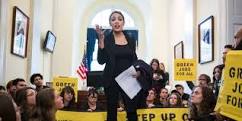Climate Change in the Political Spotlight
Legal Planet: Environmental Law and Policy 2019-03-18

Generally, climate change doesn’t get much attention as a political issue. That may be changing now. And if it is, that could have important implications.
One sign of the times is Jay Inslee’s run for the Presidency. He may not be at the top of the lists of prospects, but he’s an established, well-respected political figure. And climate change is the centerpiece of his campaign. As the Atlantic observes, “[o]ther Democrats are, suddenly, talking about climate change.” The Atlantic gives numerous examples: “Bernie Sanders prioritizes it in all his speeches, and a few weeks ago he held a ‘national town hall’ on what he called ‘the great crisis facing our planet, facing humanity.’ Booker, Harris, and Warren have all voted in the Senate on progressive environmental bills, and Tom Steyer has written huge checks to many green causes.” Some of these political figures, like Sanders, are in the progressive wing of the Democratic Party. Others, like Inslee, are mainstream liberals.Contrast this with 2016, when Hillary Clinton only mentioned climate change in one sentence of her nomination acceptance speech.
Climate change is also getting fresh attention in Congress with the creation of a select House committee on the issue. Support for climate action has also taken more dramatic form.. In November, Alexandria Ocasio-Cortez joined 150 young climate activists in a Tuesday sit-in at House Minority Leader Nancy Pelosi’s Capitol Hill office. Ocasio-Cortez also leads the charge among young new group of Progressives in the House for a Green New Deal, which centers on renewable energy and the climate crisis. The Green New Deal resolution is a product of that effort.
Why is climate change more in the political spotlight these days? One reason may be a shift in public opinion. As I discussed in a post in December, there’s been a significant shift in public attitudes in just the past few years. There have been 10% increases in the past four years in the number of Americans who believe climate change is happening and in the number who think it’s a serious problem. There’s also a generation gap, with younger Americans taking an especially strong stand on the issue, Even within the Democratic Party, younger politicians like AOC seem to be in the lead in pushing the climate issue. is reflecting the views of her generation on this issue. In January, the Times reported on a joint Yale/George Mason study:
“[M]ajorities in both parties think the government should fund research into solar and wind energy, offer tax rebates to those buying energy-efficient vehicles and solar panels, and encourage schools to teach children about the causes and consequences of global warming, and potential solutions. A majority of Democrats and Republicans believe the United States should participate in the Paris climate accord and reduce greenhouse gas emissions regardless of what other countries do.”
At the end of January, another Yale/George Mason survey found that 73% of Americans think global warming is happening, up from 70% last March, and 72% said climate change was important to them, a 9% increase in less than a year. Another poll found that the dramatic increase in extreme weather events has been an important factor in this shift. And of course, there is mounting evidence from the scientists about the severity and urgency of the problem, which may be filtering through to politicians and the public. All of this makes climate change a more politically salient issue.
The increased political spotlight on climate change is a very promising sign in terms of the likelihood of serious policy action. In the past, it hasn’t been easy to mobilize the public on this issue, but that may be changing.